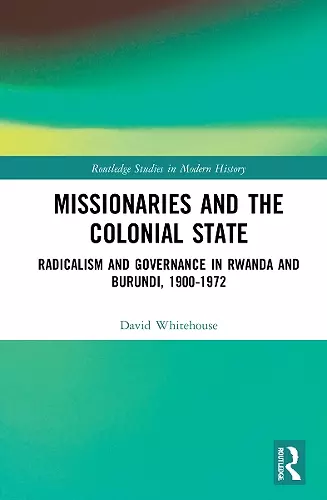Missionaries and the Colonial State
Radicalism and Governance in Rwanda and Burundi, 1900-1972
Format:Hardback
Publisher:Taylor & Francis Ltd
Published:12th Aug '22
Should be back in stock very soon
This hardback is available in another edition too:
- Paperback£40.99(9780367704025)

Catholic and Protestant missionaries followed their own, competing agendas rather than those of the colonial state. This volume unravels these agendas and challenges received wisdom on the histories of Rwanda and Burundi, as well as the colonial relationship between state and mission.
The archives of the White Fathers Catholic missionary order in Rome and Paris are read alongside primary sources produced by the British Protestant Church Missionary Society to analyse their impact between 1900 and 1972 in Rwanda and Burundi. The colonial state was weaker than often assumed, and permeable by external radical influences. Denominational competition between Catholic and Protestant missionaries was a key motor of this radicalism. The colonial state in both kingdoms was a weak, reactive agent rather than a structuring form of power. This volume shows that missionaries were more committed and influential actors, but their inability to manage the mass demand for the education that they sought and delivered finally undermined the achievement of their aims.
Missionaries and the Colonial State is a resource for historians of Christianity, Belgian Africa specialists, and scholars of colonialism.
"Authored by David Whitehouse, “Missionaries and the Colonial State: Radicalism and Governance in Rwanda and Burundi, 1900–1972” is a brilliant addition to the existing knowledge of the subject. The originality and main point of this work is that the missionaries followed their own agendas as opposed to the agenda of the Belgian colonial state in Rwanda and Burundi. Of the two, the missionaries had the upper hand. The colonial state was weak – it lacked the capacity to articulate and enforce its own agenda. Crucially, besides this main theme, the book analyses the key moments in history of Rwanda and Burundi, such the overthrow of the Tutsi Kings, Musinga in 1931, Kigeli in 1959, and the launch of the Hutu rule under Gregoire Kayibanda in what became known as the “social revolution.” The book also examines the fragmentation of the Hutu ruling elite into Southern and Northern factions that led to the overthrow of President Kayibanda by General Juvenal Habyarimana in 1973. This work is not only an important resource for historians of Christianity and colonial rule in Belgian Africa, it is vital for Rwandans and Burundians who seek to enlighten themselves on the actors that shaped our history that still impacts our countries" - David Himbara, Educator, Author and Professor of International Development, based in Toronto, Canada
ISBN: 9780367704018
Dimensions: unknown
Weight: 480g
250 pages